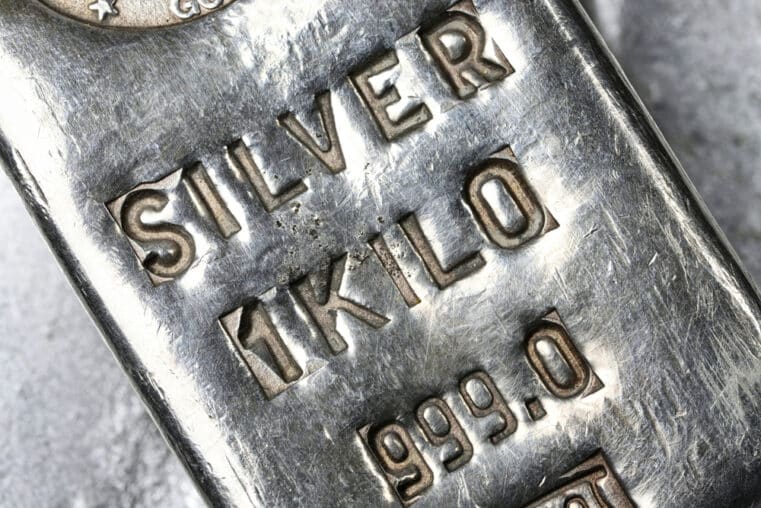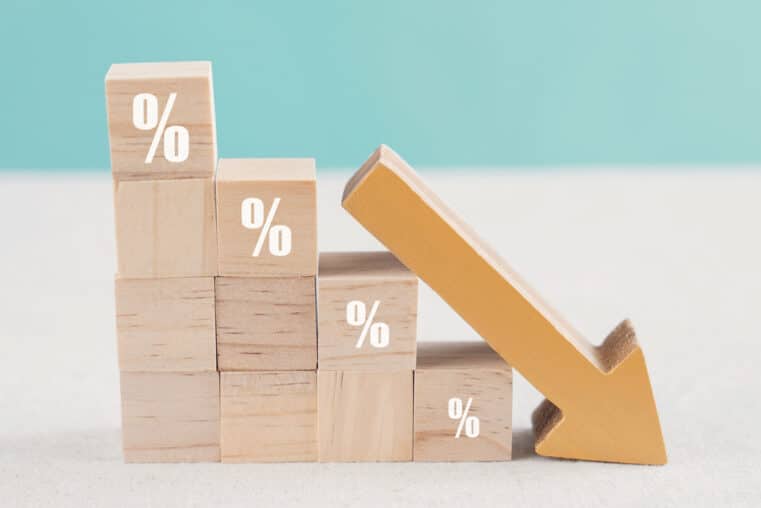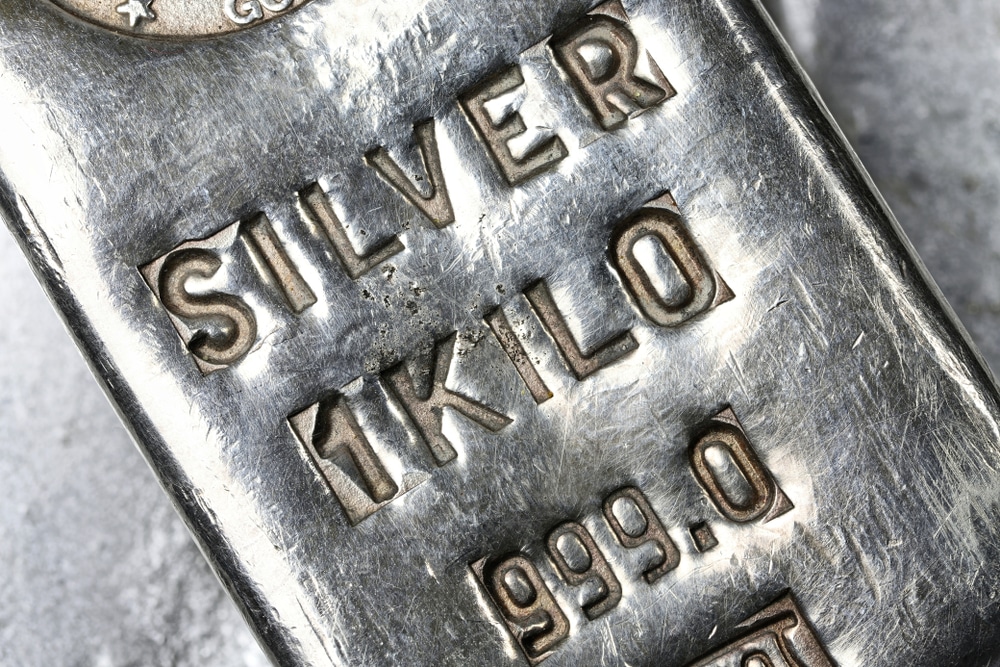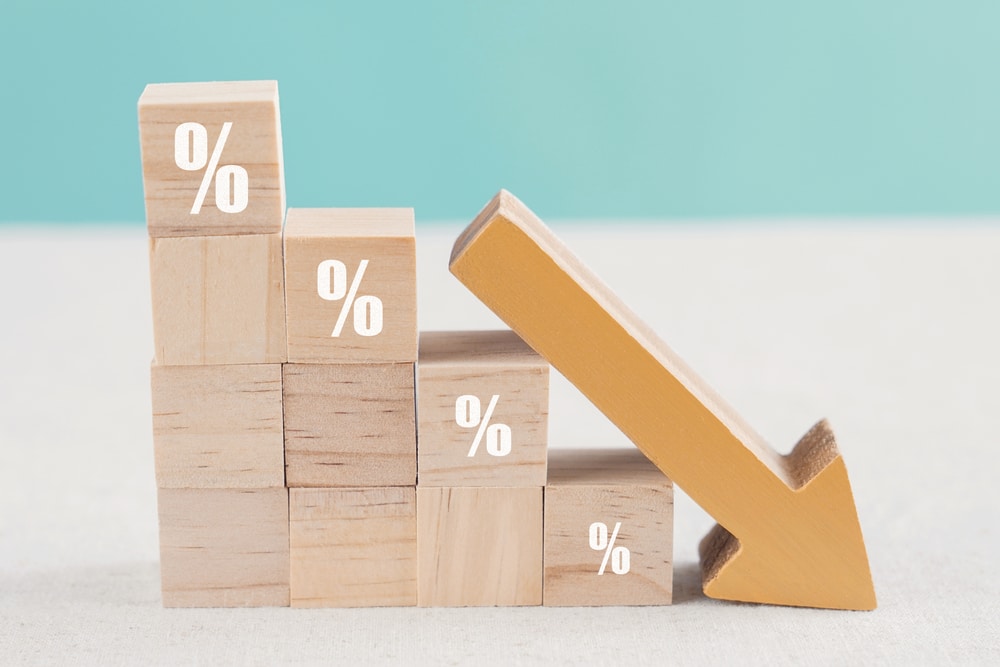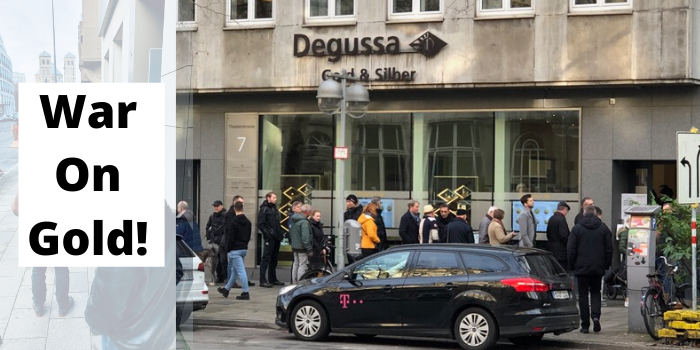
What We Can Learn from Germany’s War on Gold... Is The US Next?
In late December, German precious metal shops found themselves overrun by customers seeking to purchase gold.
The situation was a bit unusual, as the lines around the shops were massive, similar to what we’d see in the US just hours before the opening of Black Friday.
As you might guess, it had nothing to do with seasonal buying. This was fear-driven--in response to two factors:
First, Germany’s interest rates were already below the zero-point, meaning that savers were subject to punitive fees for stashing money in a bank.
Second, these customers were trying to purchase gold ahead of a new draconian directive set for January 1, 2020.
The new legislation places a €2000 limit on gold purchases from the then-current limit of €10,000.
The German government’s rationale behind this new law: money laundering prevention.
Were so many “bad actors” placing transactions in gold that the federal government found no other choice but to lower the purchase limit?
To put this into context, German citizens collectively hold 9,000 tonnes of gold--more than half of it in bars and coins (the rest likely in jewelry).
So when the announcement of this forthcoming restriction came into public awareness, citizens went on a gold buying spree. Essentially, it was more like a panic.
“We are currently seeing a tripling of the normal order volume – both online and in the branches,” says Robert Hartmann from Pro Aurum, one of Germany’s top gold dealers.
But this all makes sense. What better means would the German population have to preserve their wealth, given a declining currency and steep penalties for saving?
Holding physical gold in private storage was the best way to preserve one’s wealth, and the citizens who were loading up on gold knew it.
Germany’s Gold Restrictions Had No Basis in Fact
The German government claims that the current action falls within the EU Anti Money Laundering Directive, introduced in 2018, albeit a modified version passed by the Bundestag (their version of parliament) on November 29.
In other words, the original EU Directive made no mention of precious metals, so Germany had to make rather aggressive modifications to the original legislation.
It isn’t inconceivable that gold may be used to finance illicit activities. But shouldn’t such a decision on the part of the federal government be informed by fact?
When the 2019 bill was being hashed out in the course of debate at the Bundestag, some parliamentary members decided to ask questions, seeking the hard evidence behind this legislative proposal.
Here how Germany’s federal government responded to the questions--original source here:
Q 1. To the best of the knowledge of the Federal Government, what is the value of the precious metals held by private individuals in Germany?
Answer: The Federal Government has no knowledge of this.
Q2. What was the annual volume of trade in precious metals in Germany during the last five years, according to the Federal Government (please break down the answer according to the individual years and precious metals)? How much of this is accounted for by private individuals?
Answer: The federal government has no information on this.
Q3. To the knowledge of the Federal government cabinet, what was the annual volume of cash transactions for precious metals in Germany in the last five years (please break down according to the individual years)?
Answer: Money laundering supervision of the trading of precious metals in the non-financial sector is the responsibility of the Länder. Therefore, the government cabinet has no information on the annual volume of cash transactions in precious metals.
Q3 a) How many people living in Germany have bought precious metals using anonymous cash transactions in the past five years?
Q3 b) How many individual transactions of this type (cash for precious metals below Eur 10,000) have been carried out in the past five years?
Answer: The federal government has no information on this.
Q3 c) What proportion of these cash transaction business for precious metals is accounted for by trading in gold, silver or platinum?
Answer: The exact share of gold, silver, and platinum Tafelgeschäfte (anonymous over the counter transactions) is not known to the federal government. The findings available to the federal government from the competent supervisory authorities of the Lander suggest that the vast majority of them in the non-financial sector involve trading in gold. In contrast, the trade-in silver and platinum is considerably lower.
Q4. To the knowledge of the federal government, how many precious metal dealers are there currently in Germany?
Q 4 a) How many of them do transactions of cash for precious metals below the Eur 10,000 limit?
Answer: The money laundering supervision of trading in precious metals in the non-financial sector is the responsibility of the Länder… The federal government therefore has no findings.
Q4 b) According to the federal government, how many precious metal traders have been involved in money laundering or terrorist financing over the past ten years?
Answer: Reference is made to the answer to question 6b
But here’s the Q&A segment that makes the enactment of this legislation utterly preposterous.
Q6 b) In how many reporting or criminal cases was there a reference to precious metals?
Answer:
In 2017, of 59,845 suspicious transaction reports that were recorded by the Central Office for Financial Transaction Investigations (FIU), 64 related to precious metals.
In 2018, a total of 77,252 suspicious transactions reported to the FIU, 175 related to precious metals.
Combining the 2017 and 2018 figures representing suspicious transactions, it appears that the German government is concerned about a mere 0.17% of those transactions in gold.
And among those transactions, only FOUR took place in amounts less than the then-applicable threshold of €10,000.
Frank Schäffler, a Bundestag deputy, commented: “If the government lowers the threshold for Tafelgeschäfte [over the counter transactions] only because of four specific cases, it shows the absurdity of the tightening.”
Any rational person would agree. So what’s the real motivation behind this “war on gold”?
Here’s the thing: it’s likely that the German government knows that nobody buys into the money laundering argument. Not based on the figures (and lack of evidence) as presented in the Bundestag Q&A document.
It’s a trick of language or, in this case, a corrupted use of terminology, one that makes such an action more palatable--similar to the way your company won’t “fire” you but rather offer you a “career alternative enhancement,” or how politicians, when describing a military operation, won’t talk about “killing people” but rather “rendering targets non-viable.”
In this specific case, “money laundering prevention” is taken for its indirect and implicit meaning of “increased state control over citizens’ holdings and transactions.”
The motivation is statist. Gold offers anonymity. Wherein “anonymous” for the German government is interpreted as “potentially suspicious,” for regular citizens, it simply means “privacy.”
The use of gold for investment (and large-scale transactions) is a threat to the state’s control over currency.
Now, citizens can’t even purchase a 50 gram gold bar without being reported to the authorities.
Sure, gold may be popular among criminals (as would forms of cryptocurrency). But it’s more popular among regular citizens for reasons non-illicit, namely, for the purpose of holding tangible safe haven assets.
And if German citizens found their fiscal or monetary policy to be untrustworthy, then shouldn’t they have the right to seek a private means to preserve their wealth without falling under government suspicion?
Fortunately, this is not happening here in the US. But it shows you just how quickly a government can turn on its citizens should it decide to take a more “statist'' position toward establishing control.



